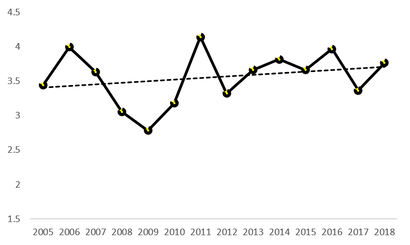
The United States Grand Prix was held yesterday. Many had anticipated a Lewis Hamilton victory which would have secured the British drivers' 5th Formula One World Drivers' Championship (WDC). This was not to be as Ferrari's Kimi Räikkönen finished in first place, with Hamilton nearly three seconds behind in 3rd place.
Regardless of Ferrari's success, this has delayed the inevitable, and with Hamilton 70 points ahead in the race for the WDC, he is likely to be crowned next weekend in Mexico City. Success for Hamilton will mean his 4th title in five years, and represent a five-in-a-row for Mercedes in the World Constructors' Championship (WCC).
Such dominance is nothing new to Formula One. Since 2000 just eight men have won the WDC. Including the 2018 Championship, and assuming Hamilton wins the title, it will mean three drivers (Hamilton, Vettel and Schumacher) will have won 14 of the past 19 WDC.
The WCC is even more concentrated. Again since 2000, just six teams have won this title, and 15 of the 19 are shared by three constructors (Ferrari (6), Red Bull (4) and Mercedes (5 including this year).
Whether this is good for the sport is an open question.
In 2010, rule changes were implemented into the scoring. Although the sport has a long history of altering the scoring system, there was a radical move to award the winner of each race 25 points. This had traditionally been 10 points or less. It could be argued that this rule change has reduced competitive balance.
Is this the case? I don't believe so. The figure above presents one measure of competitive balance, a concentration ratio, of the top two drivers in the WDC standing each year since 2005. It is hard to argue that rule changes to the scoring system in 2010 are responsibility for a reduction in competition. The sport was at its most competitive (since 2005) the year before the rule change, three of the seasons that followed have been less concentrated than the WDC's in 2005, 2006 and 2007.
The trend is suggesting a movement away from more competitive races but this may not be a consequence of the points scoring changes. The new owners may want to consider the level of competitive balance. Sports fans generally start to become disinterested in events that become noncompetitive. However, the answer to this problem might require more than just changing the points scoring within races.
 RSS Feed
RSS Feed